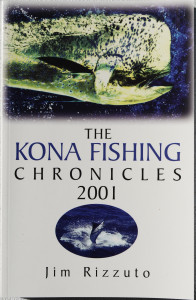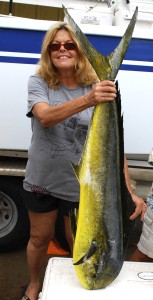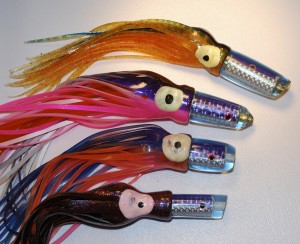As a guy who writes about big-game fishing in Hawaii, I fight with my spell-checker every day. It doesn’t know how to spell “mahimahi.” It tries to stick a hyphen between the two “mahi” parts and scolds me – even though I’m the one who knows the written Hawaiian language doesn’t have a hyphen.
 Or maybe it is a dash, not a hyphen. If any Hawaiian word deserves a dash, it is “mahi” – a very dashing word in its own right. The word means “strong and energetic” and is often used in modern days to refer to a dashing young man of strength, energy and good looks. Mahimahi have all of those traits in double doses, hence the need to double the name to do justice to the powerful and acrobatic gamefish. Hawaiians did that with other fish, too. The ulaula is not just a red (ula) snapper, it is a very red snapper. Call it “red red” like a “red, red rose,” and you’ll see the Hawaiians were already way ahead of the Scottish poet Robbie Burns who wrote the “red, red rose” line in 1794.
Or maybe it is a dash, not a hyphen. If any Hawaiian word deserves a dash, it is “mahi” – a very dashing word in its own right. The word means “strong and energetic” and is often used in modern days to refer to a dashing young man of strength, energy and good looks. Mahimahi have all of those traits in double doses, hence the need to double the name to do justice to the powerful and acrobatic gamefish. Hawaiians did that with other fish, too. The ulaula is not just a red (ula) snapper, it is a very red snapper. Call it “red red” like a “red, red rose,” and you’ll see the Hawaiians were already way ahead of the Scottish poet Robbie Burns who wrote the “red, red rose” line in 1794.
Cook undoubtedly heard the word “mahimahi” when he “discovered” Hawaii in 1778 (well after the early Polynesian settlers had already discovered it a thousand or so years before, of course). Since then the name has spread widely across the English-speaking world as a very useful substitute for the confusing word “dolphin.” Dolphin is ambiguous, of course, because it refers both to the fish, Coryphaena hippurus, and to those playful, smart, and smiley mammals of the cetacean family. Whether the word “dolphin” brings to mind the erstwhile TV star Flipper, or a pod of sleek and graceful dancers surfing your bow wave, or the bloody scene of slaughter at an annual Japanese drive-hunt, you don’t want to imagine a filet on your plate.
The mammal gets the name “dolphin” from the Greek word for “womb.” That’s fitting because true dolphins bear live young. The dolphin fish may have gotten the same name simply because it is often seen racing across the surface in leaps and bounds.

In 1758, Linnaeus, the Swiss father of taxonomy, derived the genus name Coryphaena from the Greek word, koryphe, meaning “top” or “apex.” For whichever aspect of the mahimahi’s nature makes it the “top,” your guess is as good as mine, but it would be hard to beat the mahimahi for beauty, fighting ability, endurance, fecundity, growth rate, and distribution throughout the world. The origin of “hippurus” seems to be unknown, at least to Internet sources. Something about the term suggests an origin in words meaning “horse” – yet nothing about the dolphinfish is at all horsey. In fact, “hippuris” refers to a mare’s tail, so if you must find something to hang “hippurus” on, perhaps you can be content thinking that the full length of a mahimahi’s body is shaped like one long tail.
To avoid confusion with the delphndae (dolphins and porpoises), restaurants might very well have picked any of the unambiguous C. hippurus names from a hundred different languages. Many of those refer to its bright golden colors — say, goldmakrele (German), guldmakrill (Swedish), or dorado (Spanish) etc.
Indeed, the Hawaiians may have heard their mahimahi referred to as “dorado” as early as the 1550s. Spanish maps from the mid-sixteenth century show islands located approximately where Hawaii is. “Dorado” is the common menu word in many Spanish-influenced areas, but that, too, could lend itself to an uncomfortable ambiguity. For convenience fishermen commonly shorten “dorado” to the nickname “dodo.” If you think eating flipper is abhorrent, imagine sitting down to a meal butchered from an extinct bird.
“Dodo,” by the way, is not just a convenient nickname. Some think the mahimahi is particularly stupid among fish because it will occasionally eat anything. At times, they even hit a bare hook – no bait, no lure other than the lively movement of a curved piece of metal. As with “dodo,” the shortened form “mahi’ is also popular among fast-talking Hawaii fishermen with sometimes humorous results. At a restaurant, one diner was overheard to order just “mahi” because he wasn’t hungry enough for “mahimahi.”
The word “mahi” appears in other Polynesian languages with related meanings. In Maori, it means “work.” If you don’t think it takes work to catch one, you’ve never hooked a big, strong, bull mahimahi on light tackle. (Make that a mahimahi “lapa” as males are called. The females are mahimahi “oma.” Though “bull” and “cow” are the now common terms for the sexes, those terms just pile on more interspecies
confusion.)

There may be some special guidance in a second Hawaiian meaning of “mahi.” It means to cultivate or farm. Mahimahi grow to maturity in six months and then spawn almost daily throughout their lives. Is there fish farming in their future?
At one time, some Hawaii fishermen wanted to “trademark” the name, mahimahi so that it could be used to apply only to fish caught in Hawaii waters. But they dropped the idea under pressure from stores and restaurants. At that time, less than 5% of the “mahimahi” sold here for consumption in Hawaii is from Hawaii. The rest is imported from Ecuador, the Philippines and other places outside the state.
Despite some obvious advantages when talking with the general public and the increasing popularity of the word mahimahi to describe this fish, the IGFA and scientific journals always list the fish by the common name, dolphinfish.
But I am sounding a clarion call to all Hawaii fishermen to unite – that is to unite the word mahimahi and toss out any attempt to separate the parts and thereby weaken this great Hawaiian tribute to a truly strong, energetic, hardworking – indeed even dashing – gamefish.
Jim Rizzuto
From Nick Durham: Great read Jim. To add another Polynesian meaning of ‘mahi’ – in Tongan it translates to ‘underwear’. Got to be careful with that one.
Jim Rizzuto
By the way, I wrote “spellchecker” as “spell-checker” just to show how much an unwanted hyphen can jump out at you when you know it does not belong.